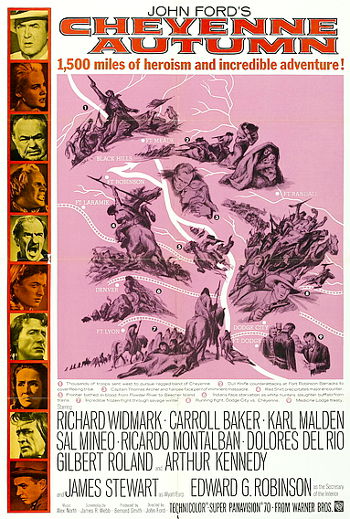 The Cheyenne Nation, living with starvation and poverty on their assigned reservation in Oklahoma in 1877, awaits a delegation from Washington to hear their grievances.
The Cheyenne Nation, living with starvation and poverty on their assigned reservation in Oklahoma in 1877, awaits a delegation from Washington to hear their grievances.
When the delegation turns back because of bumpy roads and dust storms — and the inconvenience since there’s an officers’ ball planned for that evening — the Cheyenne decide enough is enough, leave the reservation and head back home to Wyoming.
The task of chasing after them falls to reluctant Capt Thomas Archer (Richard Widmark), who’s bound to do his duty, but sympathetic to the Indians’ plight.
He has a more personal reason to set out in pursuit. The woman he loves, Quaker school teacher Deborah Wright (Carroll Baker) has decided to leave with the Cheyenne to look after the orphaned Indian children who have been attending her school.
When the elder Cheyenne chief dies, the task of leading the 1,200-mile journey back to Wyoming falls to Little Wolf (Ricardo Montalbon) and Dull Knife (Gilbert Roland).
They’ve always seen eye-to-eye, until now. Dull Knifte’s son Red Shirt (Sal Mineo) wants Little Wolf’s youngest wife for his own.
And Dull Knife, watching his people fight hunger and winter weather, is beginning to think surrender might be preferable than continuing a hopeless journey.
Meanwhile, rumors about the “blood-thirsty” Cheyenne war party are spreading, causing fear throughout the Western plains.
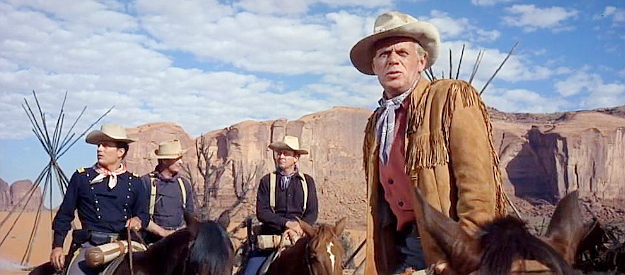
Richard Widmark as Capt. Tom Archer, realizing the Cheyenne have fled the reservation in Cheyenne Autumn (1964)
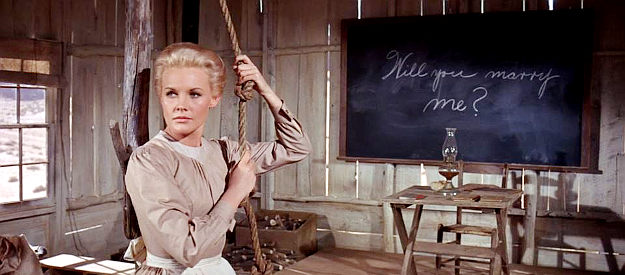
Carroll Baker as Quaker school teacher Deborah Wright, trying to get the Indian children to return and unaware of Archer’s chalkboard message in Cheyenne Autumn (1964)
This would mark John Ford’s last Western and his next to last feature film. Having “killed more Indians than Custer, Beecher and Chivington put together” on film, he set out to make a movie sympathetic to the Indians.
It’s more entertaining than most Westerns, but it’s also not completely successful in achieving that goal. It’s a long, slow-moving film, and the focus frequently shifts from the Indians to Ford’s top-billed stars — Widmark, Baker, James Stewart and Karl Maldn, James Stewart and Edward G. Robinson — none of whom were playing Indian roles.
As a result, the film is most memorable for wonderful individual scenes. Like Archer scribbling “will you marry me?” on Wright’s chalkboard, only to have her rush to erase it as soon as she sees the message.
Or Wright cradling a wounded Indian child and wondering if it matters one iota who fired the first shot when war breaks out.
Or the breakout at Fort Robinson, and the reaction of Capt. Wessels (Malden), when he realizes he has a massacre on his hands.
Speaking of Stewart, the film includes a much-debated and admittedly odd comic interlude that takes viewers to Dodge City where Wyatt Earp (Stewart), Doc Holiday (Arthur Kennedy) and Maj. Jeff Blair (John Carradine) are focused on their poker game while everyone around them worries about marauding Indians.
Ken Curtis of Gunsmoke fame also shows up at that point, playing a cowboy who has killed a Cheyenne in cold blood, but tries to pass himself off as a hero for doing so.
Ford apparently intended the scene to lighten the serious mood of the rest of the film — and taken on its own — it’s very well done.
But it seems out of place in this film, and Warner Brothers cut the scene from the film after its initial release. It was later restored when the film was released on video and DVD.
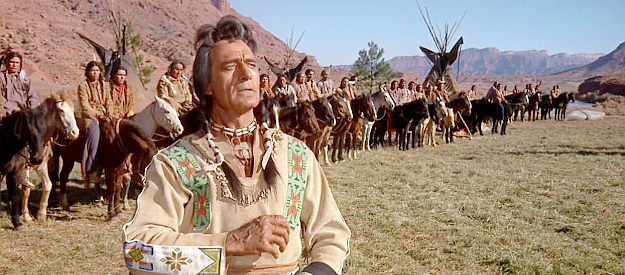
Gilbert Roland as Dull Knife, one of the chiefs who lead the Cheyenne away from the reservation in Cheyenne Autumn (1964)
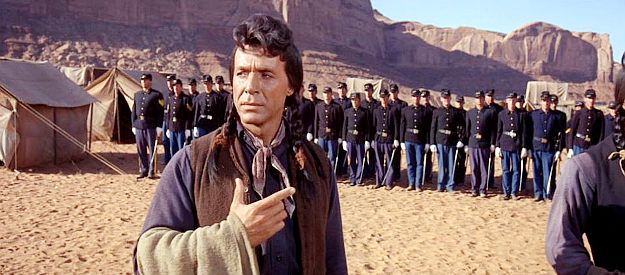
Ricardo Montalban, pronouncing that Cheyenne children will no longer be permitted to attend reservation school in Cheyenne Autumn (1964)
Directed by:
John Ford
Cast:
Richard Widmark … Thomas Archer
Carroll Baker … Deborah Wright
James Stewart … Wyatt Earp
Karl Malden … Capt. Wessels
Sal Mineo … Red Shirt
Ricardo Montalbon … Little Wolf
Gilbert Roland … Dull Knife
Dolores del Rio … Spanish woman
Arthur Kennedy … Doc Holliday
Edward G. Robinson … Secretary of Interior Carl Schurz
Patrick Wayne … 2nd Lt. Scott
Elizabeth Allen … Guinevere Plantagenet
John Carradine … Maj. Jeff Blair
Victor Jory … Tall Tree
Mike Mazurki … Senior 1st Sgt.
George O’Brien … Maj. Braden
Sean McClory … Dr. O’Carberry
Judson Pratt … Mayor Dog Kelly
Carmen D’Antonio … Pawnee woman
Ken Curtis … Joe
Ben Johnson … Trooper Plumtree
Runtime: 154 min.
Music: Alex North
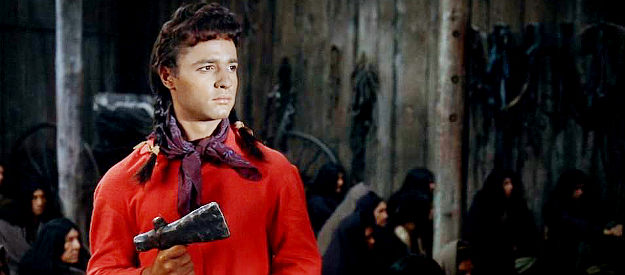
Sall Mineo as Red Shirt, about to help the Cheyenne break out of the warehouse at Fort Robinson in Cheyenne Autumn (1964)
Memorable lines:
Capt. Archer: “What happens today changes nothing. The Indian bureau is still pledged to provide you with adequate clothing and rations. You’re still pledged to abide by the law. Remember that.”
Little Wolf: “We are asked to remember much. The white man remembers nothing.”
Capt. Archer: “Will you take the blinders off, just for once? You claim no self-respecting Quaker could fall in love with a soldier. But you’ve fallen in love with a whole tribe of them. Have you ever seen a Cheyenne?”
Deborah Wright: “Of course, I have.”
Archer: “No you haven’t. All you’ve seen is reservation Indians, looking pitiful as fish out of water. But give them a chance, and they’re the greatest fighters in the world.”
She rings her school bell.
Archer: “Will you listen to me? It takes a blue coat to make a white man a soldier. But a Cheyenne is a soldier from the first slap on his butt. War is his life. He’s fierce and smart. And he’s meaner than sin.”
Deborah: “Perhaps you can only think about the past. But I’m here to think about the future.”
Spanish Woman: “They’re angry because my son fired the first shot.
Deborah Wright, cradling a wounded young Indian girl: “Does it ever matter who fires the first shot?”
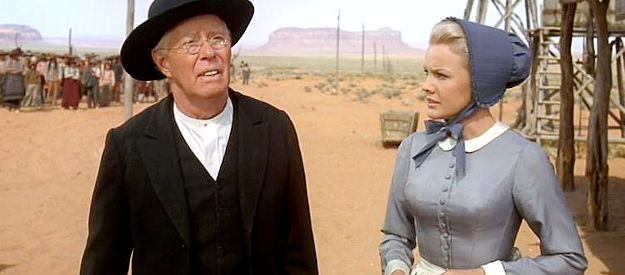
Walter Baldwin as Jeremy Wright and his niece Deborah (Carroll Baker) plead the case of the Cheyenne in Cheyenne Autumn (1964)
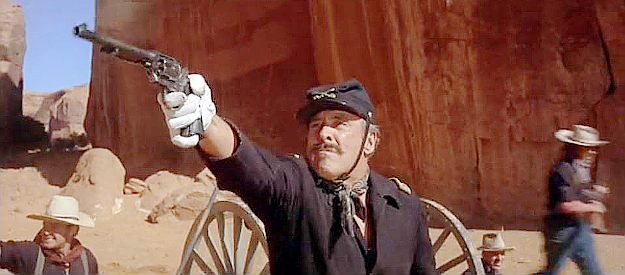
George O’Brien as Major Braden, commander of the reservation outpost the Cheyenne flee from in Cheyenne Autumn (1964)
Dull Knife: “Even a dog may go where he likes. But not a Cheyenne.”
Capt. Archer, issuing a warning to an overeager junior officer: “Remember, Mr. Scott, the trick to being brave is not to be too brave.”
Wyatt Earp: “That deck (of cards) feels light.”
Doc Holliday: “Don’t look at me. I sometimes decorate cards; I never steal them.”
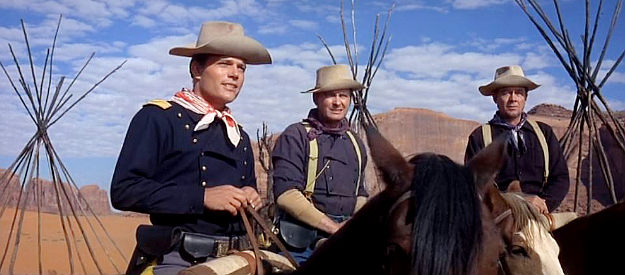
Patrick Wayne as 2nd Lt. Scott, looking to avenge his father’s death against the Cheyenne in Cheyenne Autumn (1964)
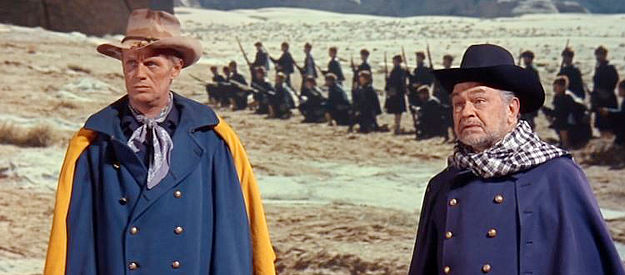
Richard Widmark as Thomas Archer and Edward G. Robinson as Carl Schurz, negotiating with the Cheyenne in Cheyenne Autumn (1964)
Doc Holliday, as he and Wyatt lead the citizens of Dodge City out of town to confront the marauding Cheyenne: “General, do you mind confiding your plan of campaign to your chief of staff?”
Wyatt Earp: “Nah. Not at all. From which direction are these blood-thirsty Cheyenne savages approaching?”
Doc: “From the southwest, of course.”
Wyatt: “And in which direction are we headed.”
Doc : “Northeast.”
Wyatt: “That’s my plan of campaign.”
Little Wolf: “You are saying there is no hope of victory. That we will die before we reach our homeland. There was hope in your heart when we started. Where has it gone?”
Dull Knight: “Maybe the hunger clawing at our bellies has clawed my hope away too.”
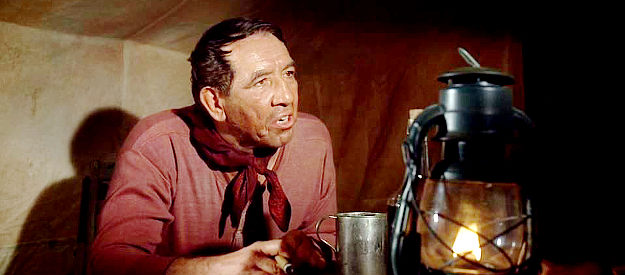
Mike Mazurki as a first sergeant, explaining why he’s about to retire from the cavalry in Cheyenne Autumn (1964)
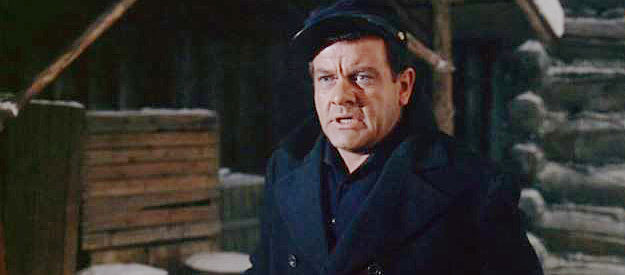
Sean McClory as Dr. O’Carberry, who tries to intervene on the Cheyenne’s behalf at Fort Robinson in Cheyenne Autumn (1964)
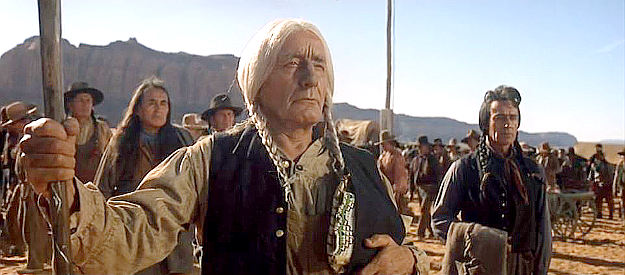
The chief of the Cheyenne, waiting to meet with white dignitaries from the East in Cheyenne Autumn (1964). Does anyone know who plays this part?
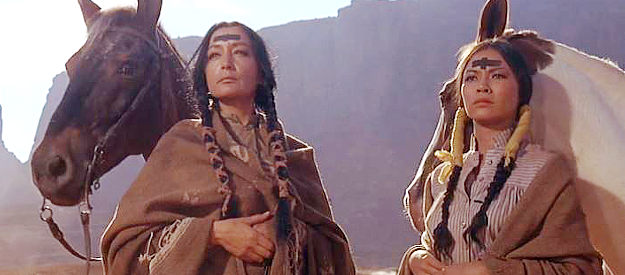
The wives of Little Wolf, the youngest of whom (left) runs off with Red Shirt. Does anyone know who plays these parts in Cheyenne Autumn (1964)?
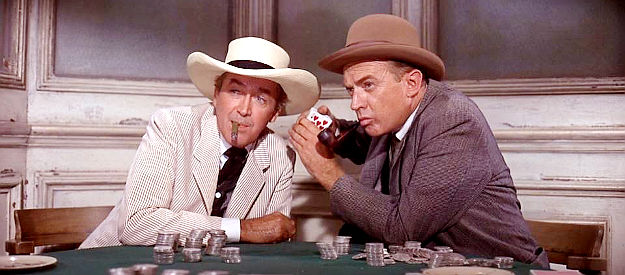
James Stewart as Wyatt Earp and Arthur Kennedy as Doc Holliday, wondering why the deck has just 51 cards in Cheyenne Autumn (1964)
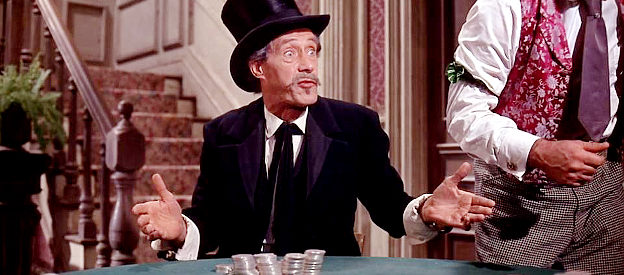
John Carradine as Jeff Blair, proclaiming innocence when a card goes missing during a Dodge City poker game in Cheyenne Autumn (1964)
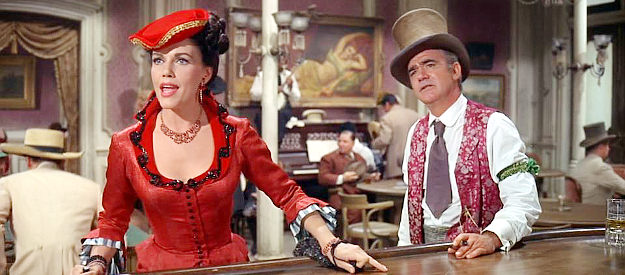
Elizabeth Allen as Guinevere Plantagenet as the saloon girl Wyatt Earp doesn’t remember with Mayor Dog Kelly (Judson Pratt) in Cheyenne Autumn (1964)
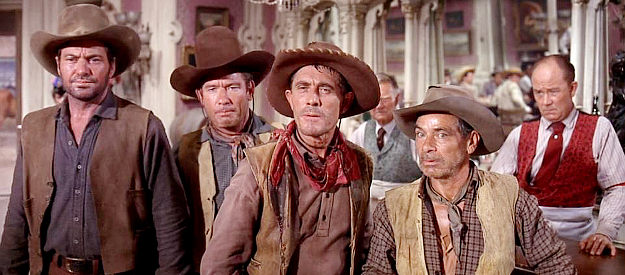
Ken Curtis as Joe (3rd from left) and his cowboy friends show up in Dodge City with an Indian scalp in Cheyenne Autumn (1964)
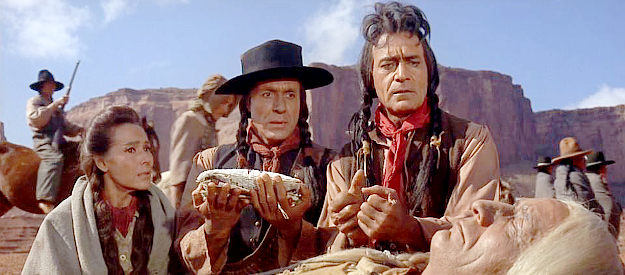
Spanish Woman (Dolores del Rio), Little Wolf (Ricardo Montalban) and Dull Knife (Gilbert Roland) look on as their chief passes in Cheyenne Autumn (1964)
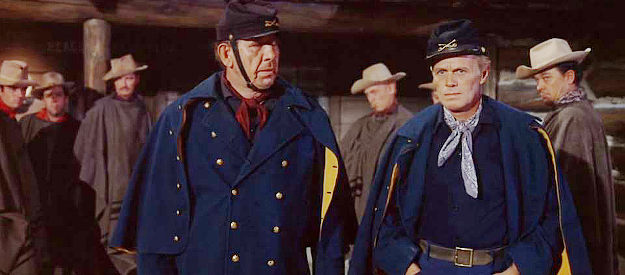
Mike Mazurki as 1st Sergeant and Richard Widmark as Capt. Tom Archer ponder what to do about the plight at Fort Robinson in Cheyenne Autumn (1964)
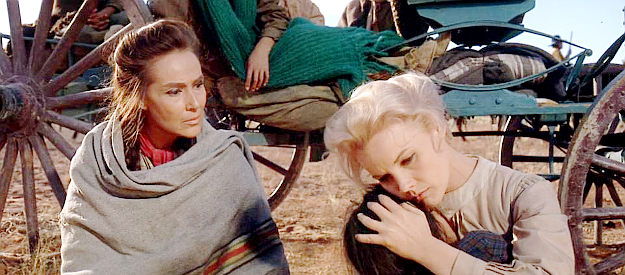
Carroll Baker as Deborah Wright cradles a wounded child while Spanish Woman (Dolores del Rio) looks on in Cheyenne Autumn (1964)
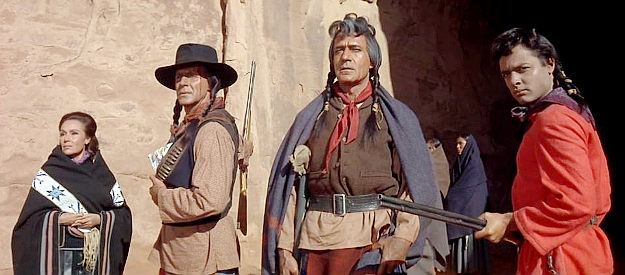
The Cheyenne — Spanish Woman (Delores del Rio), Little Wolf (Ricardo Montalbon), Dull Knife (Gilbert Roland) and Red Shirt (Sal MIneo) watch the cavalry approach in Cheyenne Autumn (1964)

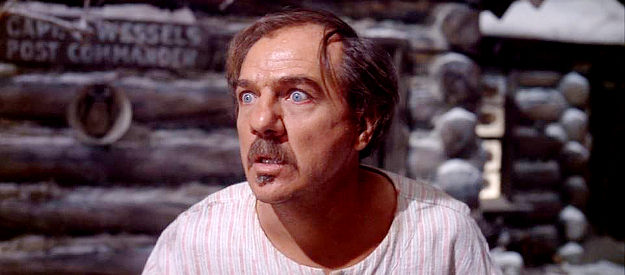
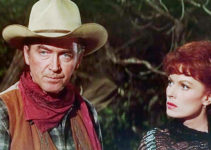

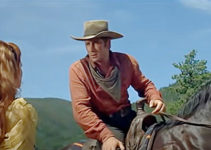
The unidentified Cheyenne chief in the photo looks like Victor Jory.
Makes sense. He’s in the cast list as Tall Tree. Thanks!